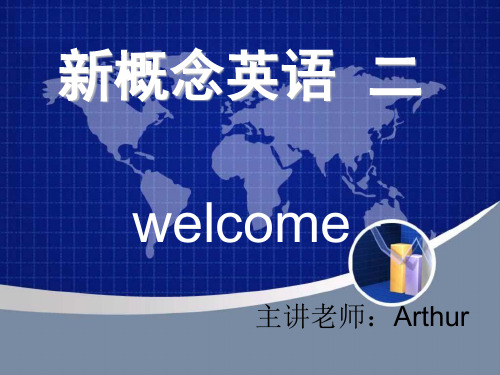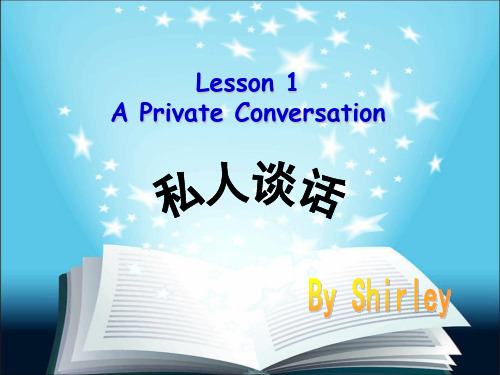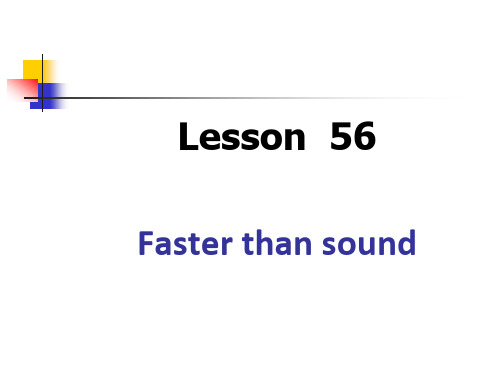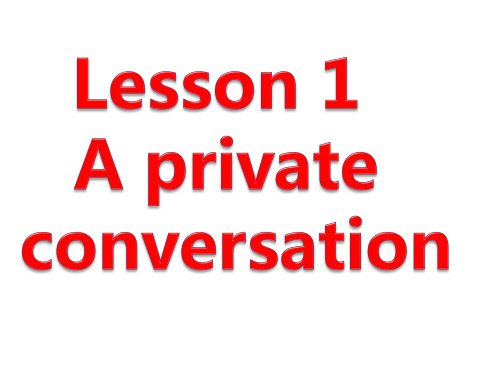最新新概念英语第二册Lesson1课件
合集下载
新概念二第一课课件Lesson 1 A private conversation

4. seat n.座位 v.安排坐下,使就坐 have a seat/take a seat 就座 (比sit down更有礼貌) have a good seat 有一个好位置 辨析:seat/sit seat只做及物动词,sit可做及物动词也可做 不及物动词 be seated 坐着,坐下;位于
新概念英语 二
welcome
主讲老师:Arthur
新概念英语二
新概念英语第二册共计96课,分4个单元(每24课一 个单元)前两个单元是对新一语法的操练和重现;第三 个单元较难,是一些复合句,第四个单元为复习单元, 每单元有一个综合考试。 新二是我们学习英语的一个过渡,同时也是一个转变。 从一个会说日常英语的人转变成一个敢动笔进行基本写 作的人。以96篇小故事为素材,培养学生听、说、读、 写的基本能力,其优势在于扩充词汇、统揽语法、集合 实践、听说兼修。在掌握第一册基本语法的基础上,由 浅入深逐步讲解语法要点,使学习者轻松掌握枯燥的语 法;通过对句型结构的分析及对短语用法的讲解,使学 习者在真正的听说读写中运用地道的句型。
问题是你想要做什么
二、主语———动词 在这一句型中,动词为不及 物动词及不及物的动词词组。在有的句子中,不 及物动词可以有状语修饰。 1.The sun is rising. 2.I'll try. 3.Did you sleep well?(well做状语,修饰不及物 动词sleep) 4.The engine broke down. 注意:在此句型中, 有少数不及物动词表达被动含义,表达主语本身 所具有的特性,不用被动语态。 1.The book sells well. 2.The window won't shut. 3.The pen writes smoothly.
新概念二 Lesson1-A-Puma-at-Large (共45张PPT)

显地, 显然 -- He was in evidence at the party. --Evidently, he was at the party.
Oblige v.使…感到必须 feel obliged to do sth 感觉有必要做某事 -- I feel obliged to say no to his demand(n.要求,
At large 这里是介词短语,此处表示 “在逃, 逍遥法外” 、“行动自由”的意思。
A puma at large
at large 逃遁的, 没有被控制的 -- The thief is still at large.
at large 详细地(= in detail)n.细节, 详 情 -- I need talk to you at large
有成功的希望 stick v.粘住 (-- stick the envelop)n.信封 sticky adj.粘的 (-- sticky fingers) stick to 坚持 (-- stick to the plan / stick to one’s
promise)n.许诺
Convince v.使…信服 convince sb of sth -- I convince him of my honesty.
The hunt for the puma began in a small village where a woman picking blackberries saw 'a large cat' only five yards away from her. It immediately ran away when she saw it, and experts confirmed that a puma will not attack a human being unless it is
Oblige v.使…感到必须 feel obliged to do sth 感觉有必要做某事 -- I feel obliged to say no to his demand(n.要求,
At large 这里是介词短语,此处表示 “在逃, 逍遥法外” 、“行动自由”的意思。
A puma at large
at large 逃遁的, 没有被控制的 -- The thief is still at large.
at large 详细地(= in detail)n.细节, 详 情 -- I need talk to you at large
有成功的希望 stick v.粘住 (-- stick the envelop)n.信封 sticky adj.粘的 (-- sticky fingers) stick to 坚持 (-- stick to the plan / stick to one’s
promise)n.许诺
Convince v.使…信服 convince sb of sth -- I convince him of my honesty.
The hunt for the puma began in a small village where a woman picking blackberries saw 'a large cat' only five yards away from her. It immediately ran away when she saw it, and experts confirmed that a puma will not attack a human being unless it is
新概念英语第二册 第一课(共22张PPT)

11. none [nʌn] pron. 没有人;没有任何东西,一个也没有,毫 无; adv. 决不 I searched bookstores and libraries for information, but found none. 我查找了多家书店和图书馆,但没查到任何信息。
12. It’s none of your business. 关你屁事;这不关你的事。
class.上课期间你要专心听老师讲课。 15. ___I_n__th__e__e_n_d____they reached a place of safety.
他们终于到达了一个安全的地方。
16. Peter and Tom made up __in___th__e__e_n_d____.
彼特和汤姆最后和解了。 17. The shelf, too weak to ___b__e_a_r___all the books,
14. private ['praɪvət] adj. 私人的;个人的;私下的;私有的
The president is paying a private visit to Europe. 总统正在欧洲进行私人访问。 We each have our private views about it. 我们每个人对这件事都有自己的看法。
关你屁事;这不关你的事。 13. __r_u_d__e_l_y_ adv. 无礼地;粗暴地 14. __p__ri_v_a_t_e__ly___ adj. 私人的;个人的;
私下的;私有的 15. __c_o__n_v_e_r_s_a__ti_o_n_ n. 谈话;会话
Step 2 在语境中加深对词汇短语的理解与记忆,掌握其具体用法。 1. theatre [ˈθiːətər] n. 电影院,戏院;戏剧
12. It’s none of your business. 关你屁事;这不关你的事。
class.上课期间你要专心听老师讲课。 15. ___I_n__th__e__e_n_d____they reached a place of safety.
他们终于到达了一个安全的地方。
16. Peter and Tom made up __in___th__e__e_n_d____.
彼特和汤姆最后和解了。 17. The shelf, too weak to ___b__e_a_r___all the books,
14. private ['praɪvət] adj. 私人的;个人的;私下的;私有的
The president is paying a private visit to Europe. 总统正在欧洲进行私人访问。 We each have our private views about it. 我们每个人对这件事都有自己的看法。
关你屁事;这不关你的事。 13. __r_u_d__e_l_y_ adv. 无礼地;粗暴地 14. __p__ri_v_a_t_e__ly___ adj. 私人的;个人的;
私下的;私有的 15. __c_o__n_v_e_r_s_a__ti_o_n_ n. 谈话;会话
Step 2 在语境中加深对词汇短语的理解与记忆,掌握其具体用法。 1. theatre [ˈθiːətər] n. 电影院,戏院;戏剧
新概念英语第二册Lesson1

Part4. Summary Writing 常见疑问句提问内容和回答方式 1. Where....: 询问地点。
回答时可以直接写地点或在句子末尾加地点。 2. Who..:询问人物
回答时可以给出人物名称 3. What...: 询问内容
回答时给出具体内容或者用名词回答 4. When...:询问时间
last month/year/morning/evening/night
Last week I went to the theatre. They watched a football game at home last night. He came to China last year. Last month my father bought a new car.
3. 表示动作状态的词语:多放在动词后 (副词) I said angrily. 我生气地说。 The young man said rudely. 那个年轻人粗鲁地说。
4. 描述人、事、物状态或特点的词语:多在名词前或be动词之后 (定语/表语) I got a very good seat. 我有一个好座位。/我的座位很好。(定语) The play was very interesting. 戏很有意思。(表语)
回答时可直接给出时间词语,或者在句子开头/末尾加入时间词语 5. How..:询问方式或状态
回答时给出表示方式的内容或者描述状态的形容词、副词等 6. 一般疑问句:用来确认是否属实
回答时:Yes,主语+疑问词肯定式。/No, 主语+疑问词否定式。
2. 表示动作的频率副词:在动词前 often, usually, always, sometimes, never, rarely She often walked to school when she was twelve years old. 在她十二岁的时候,她常常走着去上学。 He never made noise in the class before. 以前他从不在班里大声喧哗。 频率词组多在动词之后或者句末 once a day/week/month/year twice a day/week/month/year three times a day/week/month/year
新概念英语第二册Lesson1课件

I could not hear the actors.
Key structures and usage
过去进行时:过去某个时间正在进行 或发生的动作 A young and a young woman were sitting behind me.
They were talking loudly.
• • • • • • • • • • • • • • •
【Key structures】 简单陈述句的语序 陈述句一定是有主语,有动词,有宾语,有句号 6 1 2 3 4 5 6 when? Who? Action Who? How? Where? When? Which? Which? What? What? 1 ---主语,一般由名词、代词或名词短语构成,通常位于动词之前,动词必 须与主语一致,即主语决定动词的单复数形式 2 ---谓语,由动词充当 3 ---宾语,一般为名词、代词或名词短语 4 ---副词或介词短语,对方式或状态提问,往往做状语 I like her very much 5 ---地点状语,一般在方式副词之后,时间副词之前 6 ---时间状语,可以放在句首或句末 简单陈述句一定不能少的是主语, 谓语. 如果问何时何地,是一个固定搭配 when and where
• • • • • •
★business n. 事, 生意 ① n. 生意 business man :生意人 do business: 做生意 ② n. 某人自己的私人的事情 It's my business. (指私人的事, 自己处理的 事) • It's none of your business. 不关你的事。
Language points
以下短语中名词前不加冠词:
课件新概念第二册Lesson 1 A private conversation 课件

私下地 in private
.
She studies in a private school Let's discuss this later in private
n. privacy 隐私.
.
a
. private
conversation
It's my privacy. It's none of your business!
go to the theatre = go to the play 去看戏 go to the cinema 去看电影(英式英语) go to the movies 去看电影(美式英语) go to the pictures/films 去看电影
2. The play was very interesting.
moving感动的
moved受感动的
amusing有趣的 amused觉得有趣的
exciting激动人心的 excited令人激动的
boring无聊的
bored 觉得无聊的
3. I did not enjoy it. 主+谓+宾
① enjoy+名词 enjoy your life/the meal/the sunshine 享受生活/一顿饭/阳光
2.以辅音字母加y结尾的变y为i,然后再加-ly,如happy---happily,
easy-easily, busy-busily
3.少数以e结尾的形容词,要去掉e再加-ly。例如:true-truly, terribleterribly,possible-possibly等。 但绝大多数以e结尾的形容词仍然直接加ly。例如:rude-rudely, polite-politely, wide-widely等。
新概念第二册ppt课件

Lesson 1 A Private Conversation
• private • conversation • theatre • seat • play • loudly • angry • angrily • attention • bear • business • rudely
2021/7/31
2021/7/31
★attention n. 注意
• Attention ,please. 请注意(口语) • pay attention 注意
• pay attention to … 对……注意 eg. You must pay attention to that girl.
• pay a little attention 稍加注意 • pay much attention 多加注意 • pay no attention 不用注意 • pay close attention 特别注意
剧场看戏 • go to the cinema =see a film 去电影院看电影
• 以下短语中名词前不加冠词与加冠词意思有区别 • go to school 去上学; go to the school 去学校; • go to hospital去看病; go to the hospital去医院
2021/7/31
adj. 私人的 n. 谈话 n. 剧场,戏院 n. 座位 n. 戏 adv. 大声地 adj. 生气的 adv. 生气地 n. 注意 v. 容忍 n. 事 adv. 无礼地,粗鲁地
★private adj.私人的
• private life 私生活 • private school 私立学校 • It's my private letter.
新概念第二册第1课(共22张PPT)

③ go to +名词 (名词前不加冠词)
Eg: go to school 去上学 go to hospital 去医院看病
2. enjoy +sth. 喜欢,从中得到享受;
enjoy the music/ the dinner enjoy doing sth. enjoy oneself :过的开心,愉快
go to the theatre: 去看戏
① go to the +地点:去某地干嘛
Eg:go to the hospital (不是去看病,可以是去看病人)
②go to the +人’ s: 去某人开的店
Eg:go to the doctor’s (去看病) go to the butcher’s (去买肉)
I turned round again. ‘I can't hear a word!’ I said
angrily.
‘It's none of your business, ’ the young man said rudely. ‘This is a private conversation!’
['biznis]
n.事
12 rudely
['ru:dli]
ad.无礼地,粗鲁地
Private
① adj. 私人的; 反义词:public (公共的) public school 公立学校
private school 私立学校 privacy n. 隐私 It’s my privacy.
② adj. 普通的 Private citizen 普通公民 Eg:<saving private Ryan> 电影《拯救大兵瑞恩》
Eg: go to school 去上学 go to hospital 去医院看病
2. enjoy +sth. 喜欢,从中得到享受;
enjoy the music/ the dinner enjoy doing sth. enjoy oneself :过的开心,愉快
go to the theatre: 去看戏
① go to the +地点:去某地干嘛
Eg:go to the hospital (不是去看病,可以是去看病人)
②go to the +人’ s: 去某人开的店
Eg:go to the doctor’s (去看病) go to the butcher’s (去买肉)
I turned round again. ‘I can't hear a word!’ I said
angrily.
‘It's none of your business, ’ the young man said rudely. ‘This is a private conversation!’
['biznis]
n.事
12 rudely
['ru:dli]
ad.无礼地,粗鲁地
Private
① adj. 私人的; 反义词:public (公共的) public school 公立学校
private school 私立学校 privacy n. 隐私 It’s my privacy.
② adj. 普通的 Private citizen 普通公民 Eg:<saving private Ryan> 电影《拯救大兵瑞恩》
Lesson+56+Faster+than+sound(课件)新概念英语第二册 (1)

, 轰响 explosive [ik'spləusiv] n. explode [ik'spləud] vt. bomb [bɔm] n. 炸弹;vt. 投弹于, 轰炸
The bomb exploded.
★course n. 跑道,行程,过程 ① on the course 按照轨道运行 off course 偏离轨道 of course 当然 ② n. 课程 This term, I took/take seven courses.
★speed(sped,sped) v. 疾驶 ① v. 疾驶,急行 The police car sped past us. The two men sped out of the room. ② n. 速度 at the speed of 以……的速度 speed up 速度的增加, 加速;slow down 减速
建议。
soundly adj. 香甜的 Soundly slept last night,I failed to get
up this morning.
★excitement n. 激动, 兴奋 to one's excitement… 令某人激动的是…… It excited me that… 让我激动的是……
每年都会举办一次塑胶产品展览。很多供 应商都会参加展览会,展览开始之前每家 公司都很兴奋。
One of the most handsome cars was a RollsRoyce Silver Ghost. The most unusual car was a Benz which had only three wheels. Built in 1885, it was the oldest car taking part.
The bomb exploded.
★course n. 跑道,行程,过程 ① on the course 按照轨道运行 off course 偏离轨道 of course 当然 ② n. 课程 This term, I took/take seven courses.
★speed(sped,sped) v. 疾驶 ① v. 疾驶,急行 The police car sped past us. The two men sped out of the room. ② n. 速度 at the speed of 以……的速度 speed up 速度的增加, 加速;slow down 减速
建议。
soundly adj. 香甜的 Soundly slept last night,I failed to get
up this morning.
★excitement n. 激动, 兴奋 to one's excitement… 令某人激动的是…… It excited me that… 让我激动的是……
每年都会举办一次塑胶产品展览。很多供 应商都会参加展览会,展览开始之前每家 公司都很兴奋。
One of the most handsome cars was a RollsRoyce Silver Ghost. The most unusual car was a Benz which had only three wheels. Built in 1885, it was the oldest car taking part.
新概念英语第二册-lesson1课件

12 There are a lot of people at the bus stop. 13 The little boy ate greedily an apple in the
kitchen this morning. 14 She draws beautifully. 15 I like music very much. 16 They built a new school in our village last year. 17 The match ended at four o'clock. 18 She received a letter from her brother last week.
3. The play was very interesting.
[参考翻译] 那场戏剧演得非常有意 思。
[语言点] very 为副词,interesting为 形容词,副词修饰形容词一般放在 其前面。
比如: very hot非常热, quiet easy 十分简单,但good enough 为例外。
have a conversation about sth. 例:Shall we have a conversation
about your vacation ?
同义词:
conversation 无拘束或非正式的 谈话
talk
谈话内容可正式或非正式
chat
闲谈、聊天
discussion (小型的)讨论、商议
like意义要深得多。 enjoy music享受音乐, enjoy dinner享受宴会, enjoy life享受生活
② enjoy doing enjoy swimming 喜欢游泳, enjoy fishing喜爱钓鱼 ③ 一般不可说enjoy sb This morning I enjoyed my English
新概念英语第二册Lesson1(共44张PPT)

4. play n. 戏剧 play v. 玩,扮演play an important role in
5. loudly adv. 大声地 loud adj/adv. 大声的 aloud adv. 出声地,大声地
A dog is barking_________. Speak ________ please.
in private 私下里; in public 公众地
• -How old are you? • -①Sorry, this is a private question. • - ②I forgot it.
1. conversation n. 谈话 have a conversation wi. 注意 pay (no )attention to ··· 注意···
8. bear v.(bore /borne)容忍 n. 熊 近义词:stand /put up with 9. business n. 事;生意,businessman 商人 • Mind your own business! 不要狗拿耗子多管闲事!
me. They were talking loudly. I got very angry. I could not hear theactors. I turned round. I looked at the man and the woman
angrily. They did not pay any attention. In the end, I could not bear it. I turned round again. 'I can't hear a word!' I said angrily. ‘It’s none of your business,' the young man said rudely 'This is a private conversation!'.
新概念英语第二册课课件 Lesson

ቤተ መጻሕፍቲ ባይዱ
•A public house which was recently bought by Mr. Ian Thompson is up for sale.
•a public house 酒吧、酒店,口语缩略为pub •up for sale 有待出售,供出售 •be up for 有待于…,为了某一目的 •This problem is up for discussion. •这个问题有待于讨论。 •on sale 打折卖 for sale 待售;出售
• ★shake(shook,shaken) v. 摇动 • vt.&vi. 摇,摇动,抖动 • Mr. Thompson shook his head. • His hands appear to be shaking. • 他的手看上去在发抖。 • ② vt. 同…握手 • Dan shook hands with him.
A public house which was recently bought by Mr. Ian Thompson is up for sale. Mr.Thompson is going to sell coming from the bar. The next morning, he found that the doors had been blocked by chairs and the furniture had been moved. Though Mr.Thompson had turned the lights off before he went to bed, they were on in the morning.He also said that he had found five empty whisky bottles which the ghost must have drunk the night before. When I suggested that some villagers must have come in for a free drink, Mr.Thompson shook his head. The villagers have told him that they will not accept the pub even if he gives it away.
•A public house which was recently bought by Mr. Ian Thompson is up for sale.
•a public house 酒吧、酒店,口语缩略为pub •up for sale 有待出售,供出售 •be up for 有待于…,为了某一目的 •This problem is up for discussion. •这个问题有待于讨论。 •on sale 打折卖 for sale 待售;出售
• ★shake(shook,shaken) v. 摇动 • vt.&vi. 摇,摇动,抖动 • Mr. Thompson shook his head. • His hands appear to be shaking. • 他的手看上去在发抖。 • ② vt. 同…握手 • Dan shook hands with him.
A public house which was recently bought by Mr. Ian Thompson is up for sale. Mr.Thompson is going to sell coming from the bar. The next morning, he found that the doors had been blocked by chairs and the furniture had been moved. Though Mr.Thompson had turned the lights off before he went to bed, they were on in the morning.He also said that he had found five empty whisky bottles which the ghost must have drunk the night before. When I suggested that some villagers must have come in for a free drink, Mr.Thompson shook his head. The villagers have told him that they will not accept the pub even if he gives it away.
新概念英语第二册 第一课 Lesson01 a private conversation

a bear hug 热烈的拥抱 bear 熊
★ business n. 事, 生意
① n. 生意 business man : 生意人 do business: 做生意 on business: 因公出差
② n. 某人自己的私人的事情 It's my business. (指私人的事, 自己处理) It‘s none of your business. 不关你的事。 Mind your own business. 管好自己的事 情。
• seat n.座位 Please take/have
a seat. 请坐下.
Is the seat taken? 这座位有人坐吗?
打篮球 弹钢琴
play n. 戏 看戏 see a play
play v. 打(球),弹奏
play basketball
play the piano
loudly adv. 大声地 现在他们正在大声讲话。
3. The play was very interesting.
interesting adj.
• ---ing 令人… 的 • ---ed 自己感到… 的 • This book is interesting. 书有趣 • be interested in… 对……感兴趣
interest n. 兴趣 have interest in… 对…感兴趣
Words of lesson 1
public theatre
private
conversation
play
angry
angrily
seat
attention
bபைடு நூலகம்siness
stand
- 1、下载文档前请自行甄别文档内容的完整性,平台不提供额外的编辑、内容补充、找答案等附加服务。
- 2、"仅部分预览"的文档,不可在线预览部分如存在完整性等问题,可反馈申请退款(可完整预览的文档不适用该条件!)。
- 3、如文档侵犯您的权益,请联系客服反馈,我们会尽快为您处理(人工客服工作时间:9:00-18:30)。
1.第25、55课时的学习完成后,建议安排阶段复习; 2.全部课时结束之后,安排时间进行总复习,根据课堂 笔记,复习重点内容; • 3.第二册学员应在40课以后听懂纯英文授课,能进行简单 的书信写作,在听、说、读、写方面水平显著提高。
___________________________ _______________________
新概念英语2背诵500遍后的感受.txt
• 据专家说当背诵的熟练程度达到不经思索脱口而出时就产 生了所谓的舌尖效应。背诵一篇新概念2的文章大概需要 15~20遍左右(本人需要20遍)新3的文章 长度和难度都 有所增加,可能需要重复更多的次数。当你能背下来一篇 文章时,你会觉得虽然不用看书,能背下来但并不是很熟 练,背一句脑子总在想着下一句是什么。这样的背诵不能 起到学好英语的目的。有些人能背下新2新3但总觉得收效 甚微,就是因为他没达到脱口而出的地步。有些人反对用 背诵法来学英语因为这没有 什么效果。其实背诵法有没 有效果,要看你是否达到了脱口而出的境地。这时产生了 舌尖效应,汉语思维将不在阻碍英语语感和英语思维。你 会有一种豁然贯通的感 觉。
• 剑桥国际第一级(可选):共16个口语单元,作 为课后拓展。
• 新编英语听力第一册(可选):大学英语专业听 力教材。内容使用,适合听说能力的提高。
• 鼓励大家组成学习小组,完成情境表演等学习项 目。
___________________________ _______________________
___________________________ _______________________
教学内容
• 与初级的课程相比,中级日常生活英语口语培 训课程除了帮助学员纠正表达错误、培养正确的 表达习惯之外,更加注重帮助学员建立优秀的英 语日常会话技能,不仅做到表达正确,而且更加 自然流畅、谈吐得体。 中级日常生活英语口语培训课程的内容覆盖面 更广,在日常生活常见的事物与事务的基础上, 增加了人际互动交往中常谈及的话题,从全方位 地帮助学员拓展英语知识面和沟通能力。
___________________________ ______________________
学习建议
• 1.认真作好课堂笔记,课堂笔记是系统复习的重 要资料; 2.每篇课文的课后练习需要严格按照要求完成, 以保证效果; 3.尽可能抽时间做配套的练习册,巩固所学知 识。
___________________________ _______________________
•
___________________________ _______________________
• 为了证实舌尖效应本人亲自做了试验。首先用网上流传的循环背诵大 表制定了背诵新概念2的计划。然后把音频文件拷入到mp3播放器中 反复听,反复模仿跟 读,每篇文章都要模仿的惟妙惟肖,然后背诵。 当背完整本新概念2时,我又在此基础上将每篇文章背诵了将近500遍 左右。终于能在78分钟之内背完所有文 章。每一篇文章都达到了脱 口而出的地步。终于产生了舌尖效应,96篇文章背下来并没经过大脑 思考,完全是嘴巴和舌头在起作用,你会有一种和英语融为一体的 感 觉。连读,吞音,爆破,语调,节奏等这些所谓的发音难点都自然而 然的被攻破了。随便拿一篇英文来读,你会有一种洋腔洋调读英文的 感觉。听写VOA慢速英 语时感到前所未有的轻松,只需听一两遍就 能听懂,生词几乎影响不了我对新闻的理解。此时听写VOA不再是以 听懂新闻为目的了,而是以积累词汇为目的了。因 为你听写过的生词, 查过字典印象非常深刻。我试听了VOA标准英语和CNN,语速都能接 受,并不觉得快,并且能听懂一小部分。虽然只有一小部分但我却有 成 功的喜悦。我尝到了背诵法的成功。我总共用了112天。达到了舌 尖效应,听力,口语有了大幅度上升。而在此之前,我根本听不懂 VOA,口语也只会说几句日 常用语。112天让我有一种脱胎换骨的感 觉。
Practice makes perfect!
___________________________ _______________________
中级口语课程教学方案
___________________________ _______________________
课程目标
• 1. 词汇量达到4000。 • 2. 能完全进行无障碍英文交流。 • 3.能写出漂亮地道的英文文章。
___________________________ _______________________
课下活动
• 1.课前预习要求能够背诵下一课的生词;结合上课语法 要求、关键词组,能复述文章大意; 2.根据录音朗读课文,每天至少坚持半个小时以上; 3.完成教材要求的课后练习,不懂部分及时向老师反映 解决; 4.完成老师要求的背诵内容,并根据磁带听写课文内 容; 5.掌握老师教授的基本语法以及词汇、短语的用法;
课堂活动
• 1. 口语练习之情景表演。 • 2.新概念课文看图说话。 • 2. 听力练习。听文章,回答一个或两个问题。 • 3. 听课文。(关书)快问快答。 • 4. 精读。听第三遍。看书模仿。 • 5. 关书再听。 • 6. 朗读,并回答问题。 • 7. 提问。 • 8.句型操练。 • 9.根据关键词,复述课文。 • 10.话题讨论 • 11.摘要写作(课下)
___________________________ _______________________
• 我终于明白了为何许多英语专家和大师们都推崇背诵法学英语,这确 实是比较快的方法。传统的学习法:单词+语法 +阅读+做题对考试 有些用处,但我用此法学了近10年英语却一无所成。要提高英语水平 首先要打通两关:耳朵和嘴巴。最好的方法就是听说结合。不要忘了 “听”这个字左边是一个“口”。听和说是不分家的。要提高听力必 然要说,要随心所欲说也必须要不断听。要记住听的时候要一句一句 模仿,播音员怎么说你怎么说,要练的尽可能和播音员相近。不要理 会所说的句子是什么含义,更不要去翻译。你所做的就是鹦鹉学舌。 要以句子为单位,不要以段落为单位。当听力水平提高了才可一段落 为单位模仿,复述。你觉得老外语速快是因为你的嘴巴不能以这样快 的速度来说,能看懂得文章却听不懂,是因为你不能像老外那样正确 的读这篇文章。你读的文章和老外对比会发现,你读的不对,没有掌 握发音技巧,尤其是连读,爆破音,省音,节奏等。如果你读的和老 外一样正确,你可能不可能听不懂呢?
___________________________ _______________________
使用教材
• 新概念英语第二册:全书共有96课,每篇课文以 150个单词左右的小故事组成。课文故事性强, 易于学习。每篇课文重点、语法知识点各异,但 全册课文前后连贯,语法知识全面,形成了新概 念特有的英语语法体系。
